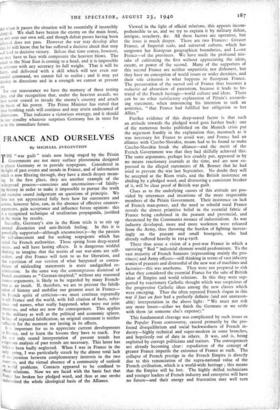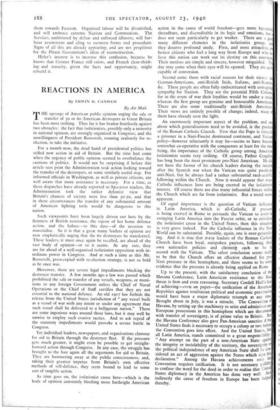FRANCE AND OURSELVES
By MICHAEL ZVEGINTZOV
p HE " war guilt " trials now being staged by the Petain 1 Government are not mere surface phenomena designed to please Germany or to provide scapegoats. Considered in the light of past events and trends in France, and of information which is now filtering through, they have a much deeper mean- ing. In the first place, they are another example of the widespread process—conscious and unconscious—of falsify- ing history in order to make it impossible to pursue the truth and exercise sound judgement on questions of principle. We have not yet appreciated fully here how far statements and actions, however false, can, in the absence of effective counter- arguments, gain acceptance and influence future opinion: this is a recognised technique of totalitarian propaganda, justified in the main by results.
Secondly, Germany's aim in the Riom trials is to stir up internal dissension and anti-British feeling. In this it is powerfully supported—although unconsciously—by the passion for self-abasement and for seeking scapegoats which has seized the French authorities. These spring from deep-seated causes, and will have lasting effects. It is dangerous wishful thinking to imagine that the merits of our war-aims are self- evident, and that France will turn to us for liberation, and that repetition of our version of what happened or contra- diction of misleading statements is mere undignified re- crimination. In the same way the contemptuous dismissal of French assertions as " German-inspired," without any reasoned counter-arguments, is likely to be regarded by many French- men as an insult. If, therefore, we are to prevent the falsifi- cation of history and mobilise our greatest asset in France— the French spirit of criticism—we must continue repeatedly to tell France and the world, with full citation of facts, refer- ences and names, what really happened, what were our joint intentions, and what are now the consequences. This applies to the military as well as the political and economic sphere. In face of repeated falsification; an original statement is neither sufficient for the moment nor lasting in its effects. It is important for us to appreciate current developments in France, and to learn the lessons they have to teach. For this not only sound interpretation of present trends but a rigorous analysis of past trends are necessary. This latter has hitherto been badly neglected. When I was in France in the early spring, I was particularly struck by the almost total lack Of co-veration between complementary interests in the two :ount7:es, and the virtual absence of a community of outlook On world problems. Contacts appeared to be confined to 3fficial relations. Now we are faced with the basic fact that France has broken her pledged word, and thus at one stroke undermined the whole ideological basis of the Alliance. Viewed in the light of official relations, this appears incom- prehensible to us, and we try to explain it by military defeat, intrigue, treachery, &c. All these factors are operative, but the issue is much deeper. There are two Frances: Greater France, of Imperial scale, and universal culture, which has outgrown her European geographical boundaries, and Lesser France—of the provinces. We have made the profound mis- take of cultivating the first without appreciating the ideas, extent, or power of the second. Many of the supporters of this second France are neither unpatriotic nor dishonest, but • they have no conception of world issues or wider destinies, and their sole criterion is what happens to European France. The preservation of the sacred soil of France thus becomes a reductio ad absurdum of patriotism, because it leads to be- trayal of the French heritage—world culture and ideas. There can be no other satisfactory explanation of Petain's astonish- ing statement, when announcing his intention to seek an armistice, " that France had fulfilled her obligation to her Allies."
Further evidence of this deep-seated factor is that such an attitude towards the pledged word goes further back : one of the numerous books published on the Munich crisis put the argument frankly in the explanation that, inasmuch as it was necessary for France to avoid war, and France had an alliance with Czecho-Slovakia, means had to be found to make Czecho-Slovakia break the alliance—and the merit of the French Government was that they had skilfully achieved this. The same arguments, perhaps less crudely put, appeared in by no means reactionary journals at the time, and are now ex- pressed in the alleged statements of M. Bonnet that he had tried to prevent the war last September. No doubt they will be accepted at the Riom trials, and the British insistence on abiding by a pledged word, and distrusting a consistent breaker of it, will he clear proof of British war guilt.
Clues as to the underlying causes of this attitude are pro- vided by utterances and intentions of the more respectable members of the Main Government. Their insistence on lack of French man-power, and the need to rebuild rural France reveals the almost primitive belief in the essential fabric of France being enshrined in the peasant and provincial, and threatened by the Communist menace of industrialism. As war industry developed, more and more workmen were released from the Army, thus throwing the burden of fighting increas- ingly on the peasant and small bourgeois, who had already suffered heavily in 1914-1918.
There thus arose a vision of a post-war France in which a surviving " Red " industrial element would predominate. To the vast majority of French Senators (representing mainly the pro- vinces) and Army officers—still thinking in terms of vast infantry armies of peasants and distrustful of the new war of machines and factories—this was anathema. They were not prepared to risk what they considered the essential France for the sake of British ideas of Empire and world relations. In this they were sup- ported by reactionary Catholic thought which was suspicious of the progressive Catholic ideas among the new classes which were emerging. Thus the often repeated French slogan in this war it Taut en finir had a perfectly definite (and not unreason- able) interpretation in the above light: " We must not risk any more losses—either we finish the Germans or we settle with them (at someone else's expense)."
This fundamental cleavage was complicated by such issues as the Popular Front controversy, caused primarily by the pro- found disequilibrium and social backwardness of French in- dustry—highly technical and super-modern in some branches, and hopelessly out of date in others. It was, and is, being exploited by corrupt politicians and traitors. The consequences are already becoming clear : repudiation of the concept of greater France imperils the existence of France as such. The collapse of French prestige in the French Empire is directly due to this renunciation of the supra-national value of the French civilisation, which is a world-wide heritage ; this means that the Empire will be lost. The highly skilled technicians and younger leaders of French industry and enterprise will have no future—and their energy and frustration may well turn them towards Fascism. Organised labour will be dissatisfied, and will embrace extreme Nazism and Communism. The Services, embittered by defeat and enforced idleness, will har- bour resentment and cling to outworn forms and procedure. Signs of all this are already appearing, and are not propitious for the Main Government's ideas of reconstruction.
Hitler's interest is to increase this confusion, because he knows that Greater France still exists, and French clear-think- ing and tenacity, given the facts and opportunity, might rebuild it.































 Previous page
Previous page